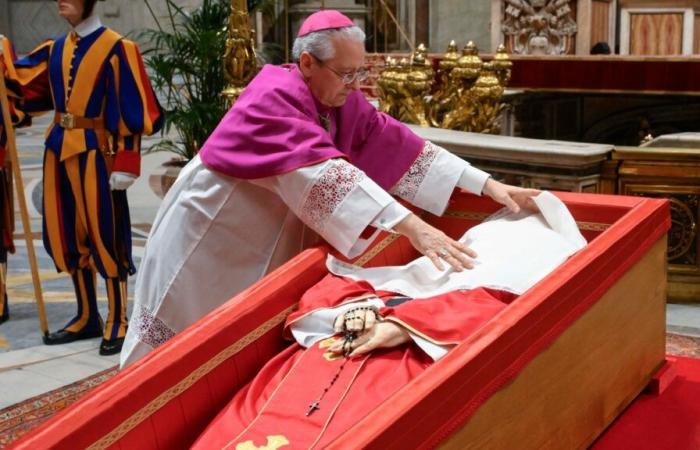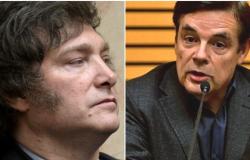Today the pontificate of the first Latin American Pope in history is buried. Of the first Jesuit chosen as Pedro’s successor. From the pastor who arrived from Buenos Aires as an “outsider” to the Vatican to start a reform process that is now in the air until the conclave is held in a few days to choose the one who will take the reins of the Catholic Church.
At ten in the morning a funeral will start for which no entry is needed. So far, 130 delegations from all over the world, with about 50 heads of state and government to the front, have confirmed their participation in the Mass of Exequias, which will be chaired by Cardinal Giovanni Battista Re, dean of the Cardinal College. With 91 years, the Purpurado Italian was always a man whom he appreciated the deceased pontiff. From him highlighted his sincerity when sharing criticism about some of his most risky proposals, but thanked them to tell the face in front of others who exerted more sibylin resistance.
Waiting for the great farewell to Francisco to begin with the expected punctuality, the square will be open from the early morning so that citizens can access. By the funeral of John Paul II, on April 8, 2005, it is estimated that they went around four million people to Rome arriving from all over the world, although only 300,000 got a place in the Plaza de San Pedro. On this occasion, 200,000 are expected. On the occasion of the Wojtyla exequias mass, thousands of pilgrims spent the previous night in the vicinity of the Plaza de San Pedro, in sleeping bags. In addition, on that occasion 25 giant screens were installed in various places in Rome to broadcast the funeral.
When the Mass is over, the last route of Pope Francis will begin through the streets of the city to the Basilica of Santa María la Mayor, where his body will receive burial. A group of 40 poor people, prisoners, transsexuals, without roof and migrants will accompany the coffin to moments before their burial. These people in need will be present at the Basilica Access Staircase, a place chosen by the Pontiff, for their eternal rest. With this
Gesture, the Holy See has remembered the cer-channel of Pope Francis with the needy people. «The poor have a special place in the heart of God. So also in the heart and teaching of the Holy father, who had chosen Francisco’s name not to forget them, ”said the Vatican.
The Pontiff expressed his desire that his mortal remains received burial in that basilica, outside the Vatican, for his “great devotion” and that they were deposited in a grave “on earth”, without decoration and with the only inscription of “Franciscus.” Each one will have a white rose in his hand. They will be about forty. The poor, the homeless, the prisoners, the transgender, the migrants will say “goodbye”, but above all “thanks” to a Pope who for many of them was like
A “father.” For them, the “last” of society, this time it will be a privilege to be the last to say goodbye to Francisco before the burial of the coffin that will take place between the Pauline chapel (Chapel of the Salus Populi Romani) and the Sforza chapel of the Liberian basilica, according to the desire of the Pope, after the funeral in the Plaza de San Pedro.
The crowd that is expected today in the squares and streets of Rome is a reflection of what has been lived along the three days of wake that closed yesterday afternoon. Around the seven the last pilgrims accessed to the epicenter temple of Christianity. The Holy See estimated that from this Wednesday about Friday, some 250,000 people have moved to the place to say goodbye to the Pope of “all, all, all”, as he commented.
At eight, behind closed doors, the coffin closing ceremony was held, chaired by Cardinal Camarlengo, Kevin Joseph Farrell. Without pilgrims, only before Francisco’s narrower collaborators and the highest responsible for the Vatican curia, the “rogito” was read, an act with his life and work. He was the master of the liturgical celebrations, Diego Ravelli, who dealt with the biography of Jorge Mario Bergoglio.
Coffin closure
After a prayer in silence and an additional prayer, the master of ceremonies placed a white silk veil on the face of the deceased Pope and sprayed the body with holy water. Subsequently, he placed the bag with the medals coined during the pontificate and the tube with the act or “rogito”, after having sealed the document with the seal of the office of the liturgical celebrations.
Next to them twelve gold coins representing the twelve years of their pontificate, as well as several silver and bronze, which symbolize the extra months and days in which Francisco grazed Catholics.
With a pairing of solemnity and sobriety, under the bucket, the zinc lid of the coffin was placed, on which the cross, the shield of the deceased Pope and the plate with his name, the duration of his life and his papacy. Just after, the coffin was sealed and the seals of Cardinal Camarlengo, the prefecture of the Pontifical house, the office of the Pontifical Liturgical Celebrations and the Vatican Chapter were printed. In the act that summarizes the milestones of his life spent and worn by the Church. In addition, in the text he is presented as “a simple and very beloved shepherd in his archdiocese, who was traveling by subway or bus.” “He lived in an apartment and was preparing dinner just because one felt one more among the people,” he highlights about his past as Archbishop in Buenos Aires.
The “Rogito” also values its decision to adopt the Pontifical Name of San Francisco de Asís for their desire to “bring in the heart the poor of the world.” “Always attentive to the last ones already discarded from society, Francisco, as soon as he was chosen, decided to live in the Santa Marta house because he could not do without contact with people,” he details himself.
In addition, he stops in the visits that throughout his more than twelve years of pontificate he made to prisons, host centers for disabled or drug addicts, in addition to his request to the priests of being “merciful” and “leaving the sacristies.”






